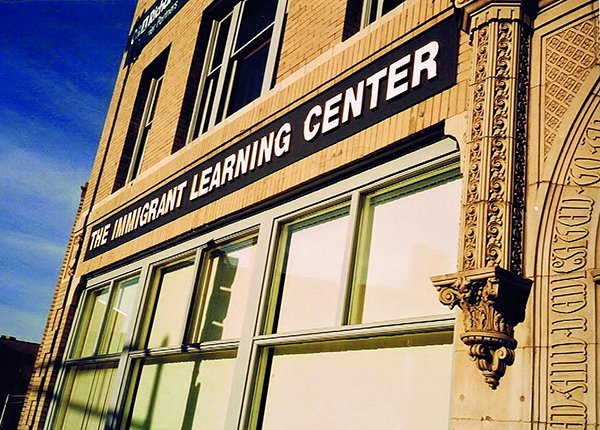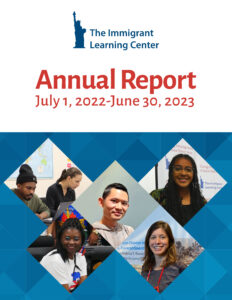The Immigrant Learning Center, Inc. (ILC) of Malden, MA, is a not-for-profit organization that gives immigrants a voice in three ways:
- The English Language Program provides free, year-round ESOL (English for Speakers of Other Languages) classes to help immigrant and refugee adults in Greater Boston become successful workers, parents and community members.
- The Public Education Institute informs Americans about immigrants and immigration in the United States.
- The Institute for Immigration Research, a joint venture with George Mason University, produces valid, reliable and objective multidisciplinary research on immigrants and immigration to the United States.
To stay up-to-date on our student stories, webinars, research and other projects, sign up for our newsletter.

Our Values
We believe in the equality, inherent worth and dignity of all people, regardless of country of origin, immigration status, race, color, gender, sexual orientation, religion, disability or other differences. We also believe in offering everyone an equal opportunity to share their gifts and achieve their goals.
We believe the United States stands for hope, freedom and opportunity. We believe in the American Dream. By giving immigrants a voice, we help new Americans achieve their dreams. We also believe that immigrants make our country stronger, and the American people’s ability to welcome immigrants makes the United States the truly special place that it is.
We believe in adapting to changing conditions. Whether it’s the best way to teach an individual student or the best way to run an entire department, The Immigrant Learning Center finds the best way we can to give immigrants a voice. We don’t hold on to “the way we always do things” when there is a better way. We stay open to possibility and constantly evaluate our work and make changes accordingly. Some changes are more successful than others, but we always learn from experience.
At The Immigrant Learning Center, we stay focused on our mission, giving immigrants a voice, and we do it well. We adapt to changing needs but not changing trends. We don’t make change for change’s sake, and we don’t try to be all things to all people. As hard as it can be to let a need go unfilled or a good idea not implemented, we keep our resources focused on maximizing our impact by doing what we do best.
Annual Report
In fiscal year 2023, The Immigrant Learning Center served 677 students from 57 countries, from Afghanistan to Vietnam, living in 69 communities.
The ILC’s Public Education Institute produced three new lesson plan bundles, 18 episodes of the podcast JobMakers and more.
The Institute for Immigration Research, a joint venture with George Mason University, published two research reports, dozens of on-demand fact sheets and four webinars.
For all the details, you can read the full FY2023 Annual Report here.
History
1992
Diane Portnoy opened The Immigrant Learning Center on November 9, 1992, with three teachers, 60 students and 80 on the waitlist.
1996
Received first grant from MA Dept. of Education. Used funds to expand from three to four levels of English classes. The ILC continues to receive government grants, totaling roughly 25 percent of the annual budget.
Opened first computer lab with five computers
Created Family Literacy program to offer parenting-related English lessons
1997
Created first Citizenship Class
2000
Started first Literacy Class to address the needs of students with literacy challenges
2002
Held ribbon cutting ceremony on April 5, 2002, to commemorate placing The Immigrant Learning Center’s name on the building and the growth of the first 10 years
2003
Formed the Immigrant Theater Class where students learn to express themselves in English by writing and performing plays
Launched the Public Education Program to educate Americans that immigrants are assets to the country (renamed Public Education Institute in 2010)
2004
Received 27 computers from IBM, transforming the patched together computer lab into a real technology program
Expanded to the second floor of 442 Main Street, occupying three full floors
2005
Released first two research studies about immigrants in the United States
2008
Established the Senior Conversation Class for students aged 60 and above who may otherwise be socially isolated
2010
Expanded to the fourth floor. Now occupying four out of five floors at 442 Main Street
2011
Co-sponsored the first, annual Swearing-In Ceremony for new American citizens with the City of Malden
2012
The ILC Public Education Institute held its first online workshop for educators. The Institute now produces multiple webinars per year for multiple audiences reaching up to 1,000 people at a time.
Partnered with George Mason University to create the Institute for Immigration Research
Held first, annual The ILC Immigrant Entrepreneur Awards Dinner
Launched Immigrant Entrepreneur Hall of Fame
Debuted book, Immigrant Struggles, Immigrant Gifts
2013
Institute for Immigration Research released their first research brief.
2015
Created a Citizenship Class for students in the Literacy Program
2016
Piloted the English for Entrepreneurs Class
Institute for Immigration Research launched Immigration Data on Demand, a free service available to the public.
2017
Added Next Steps Class to focus on helping students reach education and job goals
Modernized computer lab with grant from The Adelaide Breed Bayrd Foundation
2019
Renamed The ILC Immigrant Entrepreneur Awards as the Barry M. Portnoy Immigrant Entrepreneur Awards
2020
Switched to virtual teaching during the COVID-19 pandemic
Published first curriculum in the Teaching U.S. Immigration Series
2021
Hired first executive director, Vince Rivers
2022
Celebrated 30 years of giving immigrants a voice
Returned to in-person classes
Expanded into the building’s third floor, occupying all five floors of the building
Served more than 11,500 students to date from 122 countries and 89 Greater Boston communities

